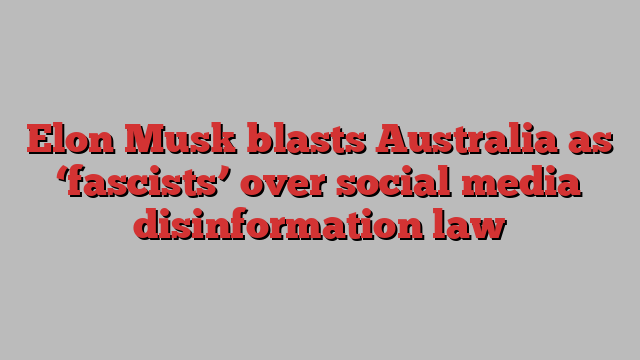
Unlock the Editor’s Digest for free
Roula Khalaf, Editor of the FT, selects her favourite stories in this weekly newsletter.
Elon Musk has lambasted Australia’s government as “fascists” over proposed laws that could levy substantial fines on social media companies if they fail to comply with rules to combat the spread of disinformation and online scams.
The billionaire owner of social media site X posted the word “fascists” on Friday in response to the bill, which would strengthen the Australian media regulator’s ability to hold companies responsible for the content on their platforms and levy potential fines of up to 5 per cent of global revenue. The bill, which was proposed this week, has yet to be passed.
Musk’s comments drew rebukes from senior Australian politicians, with Stephen Jones, Australia’s finance minister, telling national broadcaster ABC that it was “crackpot stuff” and the legislation was a matter of sovereignty.
Bill Shorten, the former leader of the Labor party and a cabinet minister, accused the billionaire of only championing free speech when it was in his commercial interests. “Elon Musk’s had more positions on free speech than the Kama Sutra,” Shorten said in an interview with Australian radio.
The exchange marks the second time that Musk has confronted Australia over technology regulation.
In May, he accused the country’s eSafety Commissioner of censorship after the government agency took X to court in an effort to force it to remove graphic videos of a stabbing attack in Sydney. A court later denied the eSafety Commissioner’s application.
Musk has also been embroiled in a bitter dispute with authorities in Brazil, where the Supreme Court ruled last month that X should be blocked over its failure to remove or suspend certain accounts accused of spreading misinformation and hateful content.
Australia has been at the forefront of efforts to regulate the technology sector, pitting it against some of the world’s largest social media companies.
This week, the government pledged to introduce a minimum age limit for social media use to tackle “screen addiction” among young people.
In March, Canberra threatened to take action against Meta after the owner of Facebook and Instagram said it would withdraw from a world-first deal to pay media companies to link to news stories.
The government also introduced new data privacy measures to parliament on Thursday that would impose hefty fines and potential jail terms of up to seven years for people found guilty of “doxxing” individuals or groups.
Prime Minister Anthony Albanese’s government had pledged to outlaw doxxing — the publication of personal details online for malicious purposes — this year after the details of a private WhatsApp group containing hundreds of Jewish Australians were published online.
Australia is one of the first countries to pursue laws outlawing doxxing. It is also expected to introduce a tranche of laws in the coming months to regulate how personal data can be used by artificial intelligence.
“These reforms give more teeth to the regulation,” said Monique Azzopardi at law firm Clayton Utz.